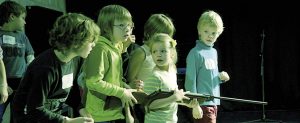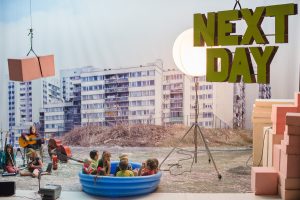The children introduce themselves one by one. They build sets, make music and play scenes. A catastrophe is imminent. They speculate loosely: will it be a nuclear or biological attack, a plane or a missile, a tsunami or a bombing? In Next Day, seen last weekend at Theatre Frascati, they are practising for an attack by 'aliens'. At least that sums things up well.

It is always moving, the uninhibited and casual dedication with which children can be on stage. Phillipe Quesne has given them all the space they need in Next Day. Scowling and slouching, they perform without ever shooting into a cramp of obligation because of the monkey-watching audience beyond. The band's repertoire includes cowboy tunes, noise and Nirvana. In between, they are building a defensive foam structure. The players, girls and boys aged 7 to 13, work through a large number of scenes in exemplary fashion without ever suffering from any heaviness.
French playwright Phillipe Quesne, known for such diorama shows as L'effet de Serge, La mélancolie des dragons and Big Bang, has with Next Day once again delivered a light-hearted tableau vivant with slightly dark undertones. Next Day is produced by Campo Gent, which has a tradition of theatre work with children for adult audiences (Platel, Etchells, Gobsquat, Martens).
The suburban setting, plastic guns, makeshift shelters, pelting the audience and handing out food - it is up to the adult audience to think more of this. As the children build their world in an equally efficient and unrestrained collaboration, the performance refers to all those situations that make life hell for many children: neglected suburbia, refugee camp, intifada.
Next Day shows the power of individual children, how they can start each day or each scene anew and, while improvising, playing unencumbered and uninhibited, reduce the world to proportions and dynamics that suit them. Quesne shaves with Next Day along the utopian image of childhood. Instead of using children to fulfil this image, he lets them build a reality by choosing and acting together on stage.
Children, animals and puppets or little machines always do well on stage. Their innocence moves and recalls the impossible state of paradise or clean hands. But Quesne reverses the proportions. The children do not act as innocent, tender-hearted exotica in the midst of a depraved world. In Next Day Quesne shows how children have their own way of building and living together while playing, based on nonchalance, self-reliance, dedication and, above all, sympathy. And the 'aliens', of course, are the adults in the room.
See the website of the Rotterdam Theatre for more information on Phillipe Quesne's performance Swamp Club, a major international co-production playing in Rotterdam on 26 February.
https://www.youtube.com/watch?v=vrptjR-iQEg

